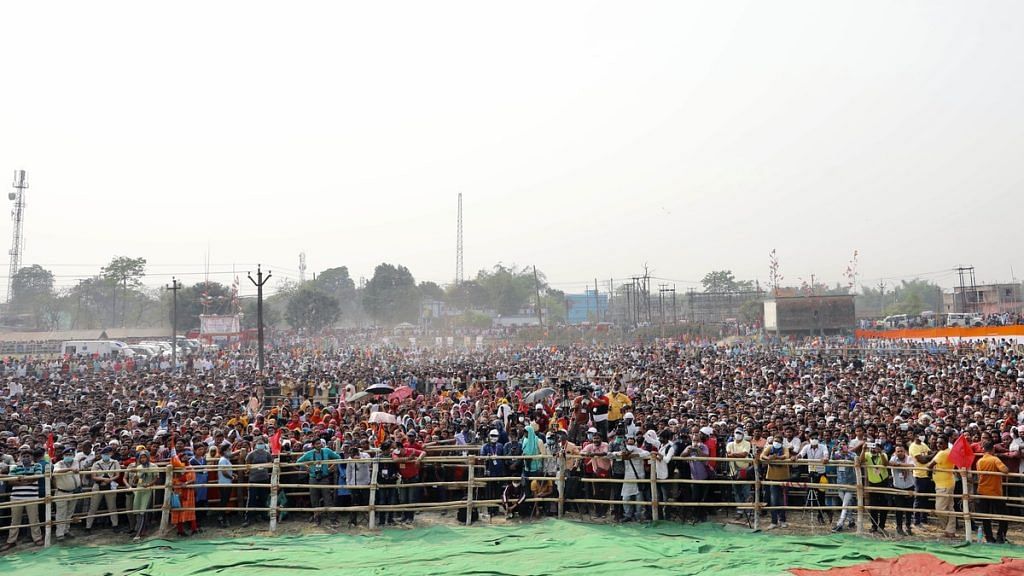Thank you dear subscribers, we are overwhelmed with your response.
Your Turn is a unique section from ThePrint featuring points of view from its subscribers. If you are a subscriber, have a point of view, please send it to us. If not, do subscribe here: https://theprint.in/
From settlements to territories,
From territories to empires
And from empires to nations…..
Civilization has come a long way in search of systems and structures through which a human population connects, cooperates and controls itself.
Kings, Emperors, Dynasties, Democracies…..In this process of evolution, democracy has been the most widely accepted structure. Yet, pronouncing democracy to be the last word on governance, would itself be undemocractic. After all, democracy is all about ‘openness to dissent’.
So, the guardians of democracy, before I mention the first dissenting note, here is an important observation
The most powerful person in the world got elected with a thin margin of 1% – not just once but in two consecutive elections. And we all know that surveys after surveys have concluded that social media was instrumental in 10% of the voting decisions.
Therefore, can such an elected regimes be still called “ A Govt..…by the people…”
Hence, my first dissenting note is : “The need for Democracy Version 2.0 has never been more than now.”
Second, a large proportion of the global economic production relies on a global delivery mechanism that comprises multiple nations. Therefore by being non-cooperative, nations attain the ability to disrupt the global supply chain. Such disruptions can provide huge short term gains for disrupting nations and possibly even electoral victories for their ruling regime.
There are enough examples to prove that success in domestic elections and global responsibilities can be on a divergent fork. Non-cooperation through introduction on newer restrictions on immigrants, refusal to follow agreed upon international treaties etc. have proved to provide big gains in domestic politics in one of the large democracies. Similarly, a nation’s position on globally critical issues like climate changes, terrorism, space & ocean rights etc. can play a fateful role in its domestic politics.
Hence, my second dissenting note is : “It is imperative that Democracy Version 2.0 should have a mechanism that compels elected leaders to expand their realm and think beyond their domestic voting class.”
Lastly, with rising global inter-dependence, every occupant of mother earth has a direct or indirect stake in every nation. So, I propose to commence a discussion on my proposition that 5% of the elected representatives in every nation should be elected by global citizens. Global citizens would typically be immigrants, elected intellectuals, rotating academicians etc.
Nations worrying about dilution of sovereign powers should not forget that the two largest democracies of the world were formed only when various provincial heads had compromised and surrender their sovereignty to form a nation. Today nations are moving towards forming a global village. Isn’t it time to re-compromise ?
Non-democratic regimes too will see value since countries disallowing role of global citizens in its domestic politics will see their own citizens being barred from playing similar roles in other countries.
Those yet not convinced on the role of global citizens may, for a moment, revisit the challenges faced by the world due to the pandemic, due to the vaccine politics and due to the logistic complexities after the outbreak.
Seven scores and eighteen years ago, our ancestors had brought forth a new definition of democracy, ‘The govt of… the people, by….. the people and for… the people’.
My third and last dissenting note, therefore, is : “The definition of 1863 still survives, but it is time we consider redefining the term ‘the people’ ”
The struggle of human civilisation against imperialistic forces had lasted for centuries. So, while the process of defining Democracy Version 2.0 has just begun, but we are also in a world where decisions are made at the speed of light. My wish and my expectation from you, therefore, is that the struggle for Democracy version 2.0 should not be very long.
Also read: SubscriberWrites: India’s ‘system’ has failed but illusion of leadership lingers
These pieces are being published as they have been received – they have not been edited/fact-checked by ThePrint.
